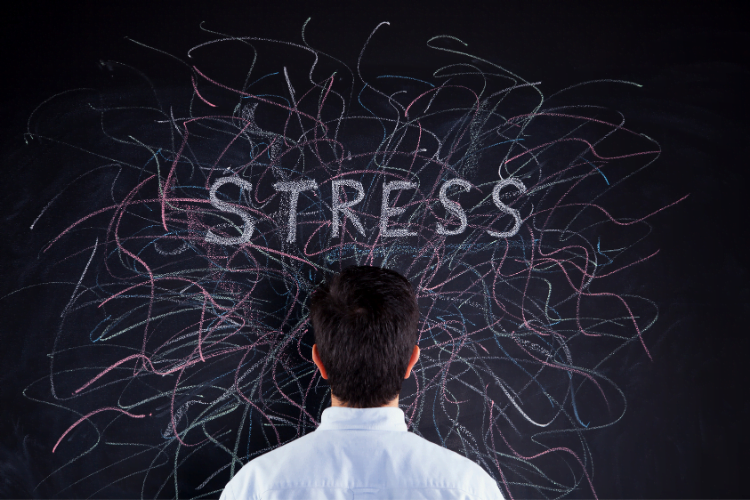Stress is a silent epidemic of the 21st century. In a fast-paced world of endless deadlines, social expectations, and digital distractions, stress has become an everyday companion. But beyond the emotional discomfort, stress affects your body and mind in profound, often invisible ways. This guide breaks down the biological, psychological, and emotional effects of stress—backed by the latest research from the World Health Organization (WHO) and Harvard University to help you better understand and manage it.
What Is Stress?
Stress is your body’s natural response to any challenge or demand. It’s a survival mechanism—short bursts of stress can help you react to danger. But when stress becomes chronic, it begins to chip away at your health, leading to serious physical and mental issues.
The Biology of Stress
When you encounter stress, your brain’s hypothalamus signals your adrenal glands to release hormones like cortisol and adrenaline. These hormones prepare your body for immediate action by increasing heart rate, elevating blood pressure, and boosting energy supplies. While this response is useful in emergencies, its chronic activation damages vital systems over time.
What WHO and Harvard Say About Stress
WHO Findings
The World Health Organization warns that chronic stress is a leading contributor to a global rise in mental health disorders, cardiovascular disease, and metabolic syndrome. According to WHO:
- Mental and neurological disorders linked to stress affect nearly 1 billion people worldwide.
- Stress-related illnesses are among the top 10 causes of disability-adjusted life years (DALYs).
Harvard Medical Research
A Harvard University study found that chronic stress reshapes the brain, shrinking the prefrontal cortex (responsible for decision-making) and enlarging the amygdala (which controls fear and aggression). Over time, this can cause a person to become more reactive, anxious, and emotionally unstable.

How Stress Affects Your Body
Stress isn’t just in your head—it manifests throughout your body. Here’s how:
Impact on the Brain and Nervous System
- Memory Impairment: Long-term cortisol exposure weakens the hippocampus, damaging memory.
- Emotional Imbalance: Anxiety, mood swings, and emotional outbursts become more common.
- Insomnia: Stress often causes difficulty falling and staying asleep.
Effects on the Cardiovascular System
- Hypertension: Chronic stress increases blood pressure and arterial inflammation.
- Heart Disease: High cortisol levels contribute to plaque buildup, increasing the risk of heart attacks.
- Arrhythmia: Irregular heartbeat or palpitations are frequently reported.
Digestive Problems
- Gastrointestinal Upset: Nausea, cramps, and acid reflux are common.
- Appetite Fluctuations: Stress can cause both overeating and loss of appetite.
- Worsening of IBS: Stress is a known trigger for Irritable Bowel Syndrome symptoms.
Immune System Suppression
- Frequent Illness: Stress lowers immune function, making you prone to infections.
- Slower Recovery: Wounds and illnesses take longer to heal.
- Inflammation Spike: Long-term stress raises inflammatory markers like C-reactive protein.
Musculoskeletal Issues
- Tension and Pain: Muscles stay tight, leading to chronic headaches and back pain.
- Increased Risk of Injury: Tight muscles are more susceptible to tears and sprains.
Skin and Hair Conditions
- Acne and Eczema: Stress boosts sebum production, clogging pores.
- Hair Loss: A condition called telogen effluvium is directly tied to stress.
- Premature Aging: Stress shortens telomeres, which are indicators of cellular aging.
FAQs About Stress and Its Impact
Q1: How quickly can stress affect the body?
Stress can begin affecting systems like digestion, sleep, and the heart within minutes to hours. Chronic stress, however, leads to long-term damage over weeks or months.
Q2: Can stress lead to permanent damage?
Yes, chronic stress can cause lasting effects such as high blood pressure, hormonal imbalance, and even brain structure changes.
Q3: Are mental effects of stress reversible?
With therapy, stress management, and lifestyle adjustments, the brain can recover its cognitive functions over time, though it may take weeks or months.
Q4: How does stress differ from anxiety?
Stress is typically a response to an external cause (like a deadline), whereas anxiety is a prolonged internal state that can exist without a trigger.
Q5: What age group is most affected by stress?
While adults aged 25–45 report the highest stress levels, teens and the elderly are increasingly vulnerable due to hormonal changes and life transitions.
Case Study: The CEO Who Couldn’t Slow Down
Meet Raj
Raj, a 42-year-old tech CEO, was working 70 hours a week, often skipping meals and sleeping less than 5 hours a night. Initially, he thrived on the adrenaline, mistaking it for passion.
Signs of Burnout
Within two years, Raj experienced:
- Chronic fatigue
- Heart palpitations
- Digestive issues
- Emotional breakdowns
Diagnosis
Doctors diagnosed him with high cortisol levels, pre-diabetes, and anxiety. A neuropsychologist confirmed stress-induced damage to his cognitive function.
Recovery Plan
Raj took a 3-month sabbatical. He focused on:
- Yoga and meditation
- Nutritional therapy
- Digital detox
- Cognitive Behavioral Therapy (CBT)
Result
Six months later, Raj returned with better clarity, energy, and focus. He reduced his workload and prioritized well-being.
This real-life case demonstrates how stress affects your body and mind and how intentional recovery can lead to transformation.
Long-Term Consequences of Chronic Stress
Unchecked stress contributes to a range of serious health issues:
- Type 2 diabetes: Cortisol increases blood sugar levels.
- Obesity: Stress encourages fat storage around the abdomen.
- Neurological diseases: Accelerated aging and neurodegeneration.
- Autoimmune disorders: Chronic stress can trigger or worsen diseases like lupus and rheumatoid arthritis.
Rising Stress in the Digital Age
The rise of technology and social media has ironically made life more stressful. Notifications, news overload, and comparison culture all fuel a state of hyperarousal. According to WHO:
- Mental health-related absenteeism has increased by over 25% since the pandemic.
- Social isolation, screen fatigue, and economic pressures are the top causes.

How to Manage Stress Effectively
Understanding how stress affects your body is only half the battle. Here’s how to manage it:
Physical Techniques
- Exercise: Regular movement, especially cardio, reduces cortisol and boosts endorphins.
- Sleep Hygiene: Avoid screens before bed, maintain consistent sleep schedules, and aim for 7–9 hours of rest.
Psychological Tools
- Mindfulness Meditation: Research shows meditation can rewire the brain, enhancing calm and focus.
- Therapy: Techniques like CBT and EMDR help reframe stressful thoughts.
- Journaling: Writing down thoughts can help declutter the mind and clarify emotions.
Social and Lifestyle Strategies
- Strong Relationships: Social support protects against stress’s worst effects.
- Time Management: Prioritize tasks and avoid multitasking to reduce overwhelm.
- Digital Detox: Take regular breaks from social media and news.
Foods That Combat Stress Naturally
Certain foods actively reduce stress and help regulate hormones:
| Food | Benefit |
|---|---|
| Dark Chocolate | Boosts serotonin levels |
| Fatty Fish (Salmon, Mackerel) | Rich in Omega-3s to balance cortisol |
| Blueberries | Packed with antioxidants |
| Chamomile Tea | Known to relax the nervous system |
| Almonds and Walnuts | Help regulate blood pressure |
Daily Habits to Build Resilience
Make stress resistance a lifestyle:
- Gratitude Practice: Write 3 things you’re grateful for each day.
- Morning Routines: Start your day with structure and calm.
- Nature Exposure: Time in green spaces reduces cortisol and blood pressure.
Conclusion
Stress is more than just a mental burden—it’s a biological threat. When left unmanaged, it quietly damages your brain, heart, immune system, and emotional health. But the good news is, you have more control than you think.
Through awareness, scientifically-backed strategies, and consistent self-care, you can prevent and even reverse many of the harmful effects of stress.
Don’t wait for burnout to take control. Take the signs seriously, because stress affects your body and mind in ways you can’t afford to ignore.





